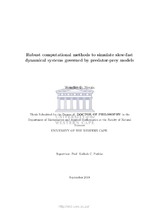| dc.contributor.advisor | Patidar, Kailash C. | |
| dc.contributor.author | Mergia, Woinshet D. | |
| dc.date.accessioned | 2019-10-09T12:51:26Z | |
| dc.date.available | 2019-10-09T12:51:26Z | |
| dc.date.issued | 2019 | |
| dc.identifier.uri | http://hdl.handle.net/11394/7070 | |
| dc.description | Philosophiae Doctor - PhD | en_US |
| dc.description.abstract | Numerical approximations of multiscale problems of important applications in ecology
are investigated. One of the class of models considered in this work are singularly perturbed
(slow-fast) predator-prey systems which are characterized by the presence of a
very small positive parameter representing the separation of time-scales between the
fast and slow dynamics. Solution of such problems involve multiple scale phenomenon
characterized by repeated switching of slow and fast motions, referred to as relaxationoscillations,
which are typically challenging to approximate numerically. Granted with
a priori knowledge, various time-stepping methods are developed within the framework
of partitioning the full problem into fast and slow components, and then numerically
treating each component differently according to their time-scales. Nonlinearities that
arise as a result of the application of the implicit parts of such schemes are treated by
using iterative algorithms, which are known for their superlinear convergence, such as
the Jacobian-Free Newton-Krylov (JFNK) and the Anderson’s Acceleration (AA) fixed
point methods. | en_US |
| dc.language.iso | en | en_US |
| dc.publisher | University of the Western Cape | en_US |
| dc.subject | Singularly perturbed problems | en_US |
| dc.subject | Stability analysis | en_US |
| dc.subject | Convergence analysis | en_US |
| dc.subject | Finite element methods | en_US |
| dc.subject | Relaxation oscillation | en_US |
| dc.title | Robust computational methods to simulate slow-fast dynamical systems governed by predator-prey models | en_US |
| dc.rights.holder | University of the Western Cape | en_US |

